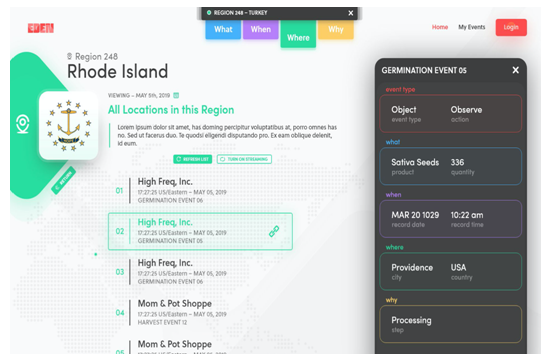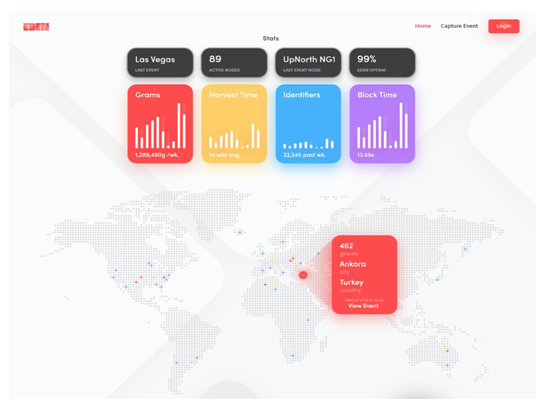EDEN is the EPCIS Decentralized Network, a blockchain-as-a-service providing supply chain visibility tools. Multichain Ventures created EDEN as a solution to the challenges of proving the provenance of goods throughout supply chains for legal cannabis businesses. For the peace of mind of responsible customers and complying with strict regulations, EDEN provides stakeholders with an easy way of viewing the lifecycle of any product as it goes through the supply chain.
Modern supply chains, built on centralized systems, raise concerns about item originality, security, and integrity. EDEN helps decentralize supply chain management to provide efficient and trustless data provenance tracking the physical movement of goods as well as the procurement of services. While current deployments of EDEN are for the cannabis industry, the blockchain-as-a-service is structurally industry-agnostic.
EDEN combines these benefits with the GS1.org global business language to establish the future of supply chain standards. EDEN applies the standardized EPCIS (Electronic Product Code Information Services) framework for communication between supply chain management systems. This blockchain infrastructure can be integrated into any existing supply chain management system for better visibility tools and provenance of data. This solves problems relating to diversion, corporate and product insurance, quality assurance, law enforcement, fraud detection, and consumer protection while structuring the data for future interoperability.
Building within the standardized framework of EPCIS, it allows businesses to operate in a regulatory environment with specific reporting variables. EDEN is fundamentally a data layer that can immutably log the data from existing ERPs and provide a standardized infrastructure to reduce the reliance on multiple reporting systems. It is designed to integrate with existing enterprise and legacy tracking systems.
How it works
EPCIS data is stored on the blockchain as “objects” usually referring to physical items, such as products, logistic units, or documents. These objects are tied to “events” which are tagged with a detailed set of descriptors for the object. Each event provides a description of the object, the date and time that the event related to the object took place, the location where the event occurred and where the object is expected to be following this event, and the business process taking place, such as shipping, along with the state of the object.
This data is all entered via off-chain hosted EDEN capture interfaces that inputs object information via IoT devices, RFID tags, QR, bar codes, or manually, which is then logged to the blockchain through the EDEN API. The events are formatted to the EPCIS core business vocabulary standards. Additional data points specific to the industry vertical can be appended to the CBV to meet state standards around reporting. The nature of the EDEN API allows stakeholders to integrate their existing IoT monitors and data capture devices seamlessly. After the data is logged to the blockchain, a front-end query interface allows for easy retrieval and visualization of the data for both auditors and business stakeholders.
Benefits of this architecture
There are many benefits to employing EDEN’s blockchain-as-a-service as a supply chain visibility toolset. All changes to the state of the EDEN repositories are stored in an immutable ledger, as every transaction is recorded, giving the data resilience in the case of data loss at any one of the network’s nodes. Additionally, the event data in the EDEN repository is designed so that it cannot be updated or deleted, so no stakeholder can make fraudulent changes.
The data is stored in an ISO-compliant global standard by GS1 so it can be appropriately audited by regulators. And with industry-specific extensions, any industry will be able to track develop more robust key performance indicators and further improve upon best practices.
Query interface

Source: GDA
The EDEN blockchain’s query interface serves primarily as a tool for auditors and business stakeholders to visualize the timeline of events and changes around products and materials within the supply chain. The system also allows for granular visualization of data. An example within the cannabis industry where there is this level of granularity would be the view of all the products passing through a single vegetation room in a multi-warehouse cultivation facility.
The query interface also allows users to summarize particular products or materials within a supply chain. In an agricultural supply chain, this type of data might include total mass-produced, the number of plants grown, total raw material processed, or sales data over a period. And since the timing of events is also tracked, the query interface can provide a visual flow of event data in a specific time frame, marked by event causes such as the maturation of a crop, harvesting, processing, and shipment. Discrete summaries of events can also be viewed in the dashboard, in addition to data visualization for more extensive macro-view summaries of larger geographic areas and the flow of an object through different events.

Source: GDA
Scalability and Security
A key aspect of EDEN’s blockchain-as-a-service is that it provides stakeholders with the ability to scale securely. Supply chain events are transacted onto the blockchain via EDEN’s high-availability application infrastructure. EDEN runs multiple redundant servers on a reliable multi-node Kubernetes cluster, and events can be recorded directly to the blockchain via separate nodes. This means that in the case that nodes run by EDEN are down, the global network can still receive inputs from entities using EDEN, with the EDEN nodes receiving the data from other nodes once back online. EDEN intends to run nodes online indefinitely, and their availability is designed to meet a minimum of 99.8% uptime.
To assure the security of the blockchain nodes responsible for submitting supply chain events to the blockchain require multiple secured keys to perform a valid request. Supply chain event data is stored inside private networks and accessible only through interface tools provided by EDEN. To curb potential threats across all their services, EDEN engages in regular security audits both internally and through an independent firm.
Conclusion
Multichain Ventures has developed EDEN as a blockchain-as-a-service to provide decentralized and secure supply chain visibility tools. The EPCIS Decentralized Network will be fundamental to creating the standardized and transparent supply chains of the future. Follow Multichain Ventures on Twitter and Telegram to get the latest updates. And you can find more information about EDEN here.
Disclaimer: This is a paid post and should not be considered as news/advice.
The post appeared first on AMBCrypto






